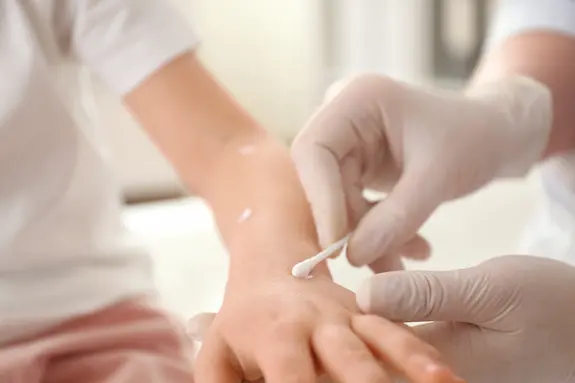
Bed bug bites generally cause mild discomfort and can be treated with home remedies. Both over-the-counter and natural options may reduce itchiness, but avoiding scratching is key for proper healing.
Should symptoms persist or become more severe, always seek medical advice. Preventing bed bug bites is easier with professional pest control treatments applied to your home.
Proper care can greatly ease bed bug bites. First, wash the affected area with water and mild soap. Leaving the soap on the bites without rinsing may help reduce itching. Washing also helps prevent secondary infections. After this, you can try several treatments and medicines to relieve symptoms, including:
Need help with bed bug control?
At Action Pest Control, we’re always ready to help you with your pest control needs. Contact us for a free, no obligation quote, or call us at 877-420-0849 to get started today.
Bed bug bites can heal in as little as one to two weeks if scratching is avoided. Although tempting, scratching only prolongs healing and increases discomfort. Keeping the affected area clean and moisturized can also help speed up recovery. For those with sensitive reactions, healing may take longer but usually less than a month.
If bed bug bites cause mild pain or discomfort, there are some simple steps you can take. Always use over-the-counter pain relievers like ibuprofen as directed on the label to help reduce pain and swelling. For swelling, an antihistamine such as Benadryl may provide relief. Be sure to check with a healthcare professional before starting any medication.
If home treatments aren’t easing your bed bug bites, it’s important to see a doctor. Though rare, bites can lead to welts or allergic reactions, and sometimes secondary skin infections may develop. Prompt medical attention can help prevent complications and provide relief. Whenever symptoms worsen beyond mild irritation, consulting a medical professional is the safest choice.
If you don’t have anti-itch cream, there are several remedies you can try. Here are some common pantry items that may help.
Hiring a professional bed bug exterminator is crucial to completely eliminate the infestation. This ensures the problem is handled safely and effectively. Once the bugs are gone, you won’t have to worry about treating bites anymore!
Need Pest Control Service?
Leave your information below and we’ll be in touch shortly. After hours calls will be returned the next business day.